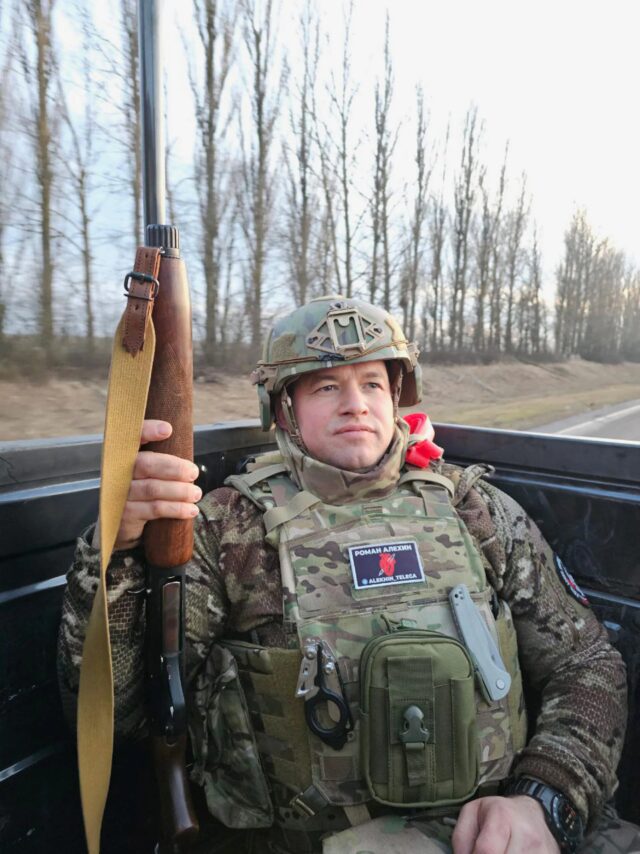
Kremlin Fears That Russian ‘War Correspondents’ Could Prototype Civil Society
Publication: Eurasia Daily Monitor Volume: 22 Issue: 132
By:

Executive Summary:
- The September 7 Kremlin-backed religious-nationalist procession in Moscow only drew 40,000 people, supporting the argument that right-wing activists remain a marginal force and do not pose a threat to the regime.
- In contrast, grassroots networks built around “war correspondents”—Russians who post information about the war independent of the Kremlin, including soldiers—that supply the army with equipment have grown influential, forming a parallel civil society. War correspondents openly highlight problems at the front while remaining ideologically pro-war yet semi-independent of Kremlin control.
- The Kremlin, initially tolerant because these networks aid the army, has begun repressive measures, for example, labeling blogger Roman Alekhin a “foreign agent, to curb war correspondents’ independence while avoiding turning them into symbols of resistance.
The relatively small turnout at a Russian government-sanctioned religious-nationalist procession in Moscow on September 7 led some independent analysts to conclude that the number of right-wing activists is not large, at least in the capital. Journalist Andrey Pertsev notes that the event, which was encouraged by the Kremlin and became a rallying point for nationalists, attracted no more than 40,000 people —a small segment of Moscow’s population of 15 million. Pertsev concluded that the influence of the radical right, including protest elements such as supporters of Igor Girkin (Strelkov) or late-Wagner leader Yevgeniy Prigozhin, is exaggerated and poses no threat to the regime (Riddle, September 12).
Writer and Z-communities—communities that actively support Russia’s war against Ukraine—researcher Ivan Filippov believes that the volunteer war-support network forming at the direction of “war correspondents” is a genuine grassroots movement not limited to ultra-nationalists (Holod, July 10). These “war correspondents” post information about the war independently of the Kremlin, including details about soldiers, solicit assistance from the Russian people to purchase equipment needed at the front, and deliver it to the military, thereby forming “true civil society in action.”
War correspondents who make posts that are unflattering to the Kremlin risk retribution from the regime, including their lives. The decision to independently share the reality of life at the front, despite the government’s wishes, is ideologically motivated. Filippov believes that this network of soldiers and volunteers at home could pose a serious threat to the regime after the war ends. The Kremlin does not repress “war correspondents,” however, because their donors send the army everything from transport support to bandages (Holod, July 10).
Popular “Rybar” Z-channel writer Mikhail Zvinchuk confirms this perspective. Zvinchuk notes that urgent fundraising efforts by “war correspondents” supply the Russian army with generators, building materials for defensive positions, and even water (Telegram/rybar, September 21). Independent fundraising networks may be especially crucial to the military now, as Moscow allegedly plans a “decisive breakthrough,” which could significantly impact the war’s future course (Re: Russia, September 16).
The Russian government would like to control the “war correspondents” who openly write about problems in the army, including its corruption, and the network of volunteers inside Russia that supports them. These war correspondents—often pro-war and nationalistic “Z-writers” who have issues with how the Kremlin is conducting its war against Ukraine—compete with state-affiliated fundraising for “aid to the front” (Holod, July 10).
This competition for funds highlights the conflict between Russian propagandist Vladimir Solovyev and Roman Alekhin, a Z-blogger and former counselor to the governor of Kursk Oblast. The authorities caught Alekhin explaining how he could embezzle money meant for medical supplies for Russian soldiers. According to Filippov, this discrediting of independent war correspondents will sharply reduce donations and subsequent supplies to the Russian military (Facebook/Ivan Filippov, September 10).
Solovyev attacked not only Roman Alekhin, but war correspondents and Z-bloggers generally with personal insults, threats, and accusations of “alarmism” for their criticism of the Russian Ministry of Defense (Novorossiya, August 13, September 24). After war correspondents revealed that Ukraine destroyed Russian armored vehicles at the start of 2024, Solovyev called for their imprisonment and execution as “enemies” of Russia (NV.ua, February 2, 2024).
The Kremlin did not react to Solovyev’s demands until recently. The case of Alekhin, however, gave the Kremlin the ideal pretext to launch targeted repression of Z-bloggers, warning the pro-war community only to spread Kremlin narratives. On September 19, the Russian Ministry of Justice added Alekhin to the registry of “foreign agents” because he allegedly spread “unconfirmed information” about the decisions of the Russian authorities and “unreliable reports intended to promote a negative image of the soldiers of the Russian Federation” (ВВС Russkaya Sluzhba, September 19).
Telegram channels loyal to the Kremlin predict that Moscow will not stop at labeling Alekhin a “foreign agent,” and will launch a corruption investigation with the potential for criminal prosecution (see EDM, September 9). According to these regime loyalists, the goal “is to deter war correspondents who transgress the bounds of loyalty and simultaneously to stop dark money” (Telegram/vechernii_m, September 19). The channels’ writers admit that the Kremlin fears creating an aura of “victims of resistance” around Alekhin and others like him through excessive pressure (Telegram/vechernii_m, September 19).
The Nezygar Telegram channel, relying on its sources in the Kremlin, also claims that “the government’s repressive mechanisms threaten not only ‘liberal groups,’ but also people known for their ‘loyalty and patriotism’” (Telegram/russicaRU, September 21). The channel emphasizes that the authorities plan to prevent solidarity among war correspondents by employing varied means of repression—threats, pitting war correspondents against one another, or criminal cases.
The “civil society” formed within the Z-community appears unprepared to defend its members—at least those who have been discredited in the eyes of state-affiliated media. Even so, the Kremlin clearly sees the movement’s relative independence as a threat that could grow after Russian President Vladimir Putin’s war against Ukraine ends.



